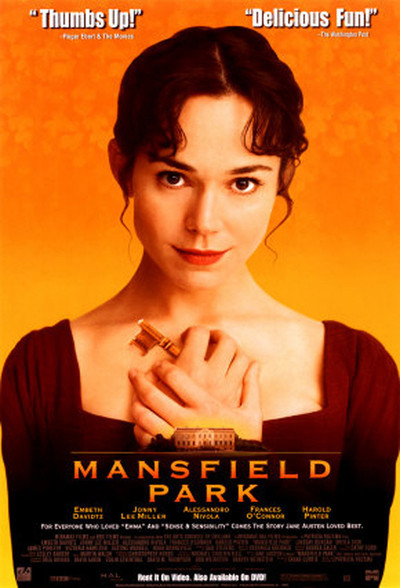
My top pick for this week is the 1999 Jane Austen adaptation "Mansfield Park". Directed by Patricia Rozema, this is a typical romance story as can be expected from its source material. However, there was something uniquely fascinating about this film that made me take notice.
The film centers around protagonist Fanny Brice (Frances O'Connor), a poor young woman who is sent to live with her wealthy relatives in their estate called Mansfield Park. As can be expected by the early 1800s setting, she is seen as inferior. However, she quickly adapts to her situation, becoming highly literate and forming a close bond with Edmund, one of the family's young men. Soon, an additional pair of residents arrive in the form of Henry and Mary Crawford, both appealing in appearance and demeanor. Thus begins a complex web of romantic longings between Fanny, Henry, Mary, Edmund (and his 2 sisters).
You may be rolling your eyes at the "soap opera" quality of it all and in many ways, you'd be justified in this assumption. However, there's much more to take away from this film than just the surface-level melodrama. As is often the case with Jane Austen's heroines, the main character serves to challenge the attitude towards women's place in society. In addition, it's an interesting commentary on the social hierarchy imposed by the landed gentry of the time. There's always the sense that Fanny is the smartest person in the room, yet she is often repressed due to her gender and social standing.
To add to those traditional themes of 19th century period dramas, it also brings up the question of slavery. Even though we never actually see a slave, the script is always acutely aware of its importance. We often think of the evil plantation class as the main culprits in this horrific practice, but the seemingly pleasant Old World bourgeoisie were just as liable, maybe even more so. As someone living in a region where the desire for reparations is becoming a hot topic, this was a particularly interesting reminder of the far-reaching benefits derived from slavery.
Indeed the social commentary adds a lot of depth, but the romance is the main focus of the plot. Brimming with wit and energy, the screenplay gives the cast some great material to work with. The film has a rare authenticity in the way it portrays the complicated nature of love and relationships. Even though the outcome seemed preordained, the plot detours were surprisingly unpredictable (I'm familiar with the novel). So even when Rozema's directing fell into its placid tendencies, I was still wrapped up in this beautiful story.
Thankfully, the actors did the screenplay justice, instilling each character with due intrigue and specific appeal. From Frances O'Connor to Lindsay Duncan (on double duty playing Fannie's mother and aunt), it's a fine parade of wonderful character acting. I was legitimately surprised to find out that there was hardly any awards attention for any of the actors. Perhaps, the film was dismissed for its admittedly conservative artistry. However, I still maintain that there's a lot to appreciate in the film's strong sense of time and place. "Mansfield Park" tugged at my heart strings while simultaneously giving me food for thought. That's more than I can say for the majority of today's romance films. I'd gladly recommend it to fans of the genre.
| Tweet |






Thank you for the post. Keep doing it!
ReplyDeleteCANCEL AUTOMATIC RENEWAL OF THE AVAST SUBSCRIPTION
Cancel Your Current AVG Subscription & Overview of avg tuneup
Fix Error 383 – Malwarebytes for Windows Support
Roadrunner Email Service| Roadrunner Email Problems 2021
Who Wants Free Traffic For Their Website